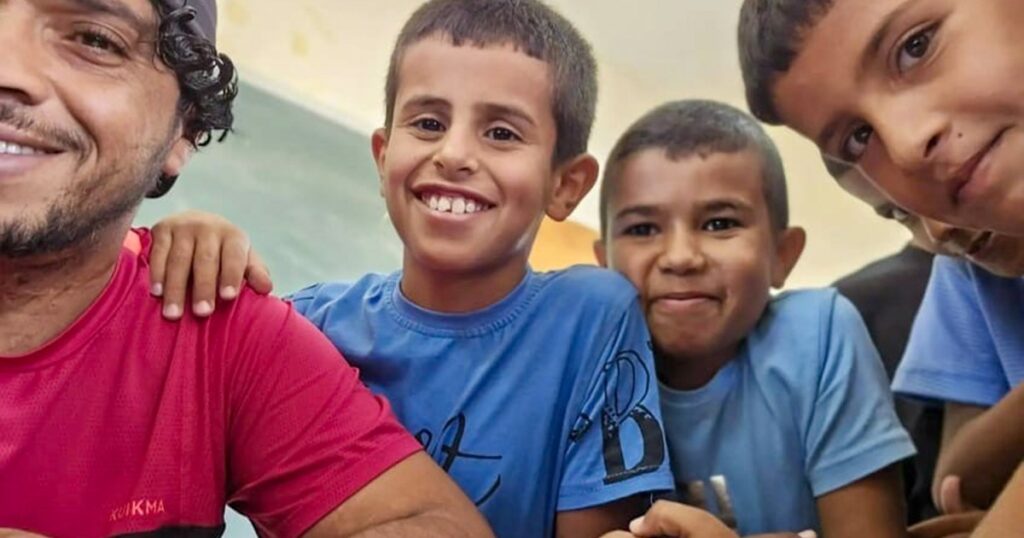More than 60 Palestinian women are staging a hunger strike to demand the release of the body of Palestinian activist and English teacher Awdah Hathaleen, who was shot dead last week in the village of Umm al-Kheir, south of Hebron in the occupied West Bank.
Two women have received medical treatment as a result of the collective action, which started on Thursday.
The group is demanding the unconditional release of the body of the 31-year-old community leader who co-directed No Other Land, a documentary film that won an Oscar award this year. Israeli police set several conditions, including holding a quick and quiet burial at night outside the village, with no more than 15 people in attendance.
The protesters are also demanding the release of seven Umm al-Kheir residents arrested by Israeli forces who remain in administrative detention – a quasi-judicial process under which Palestinians are held without charge or trial.
Umm al-Kheir is part of Masafer Yatta, a string of Palestinian hamlets located on the hills south of Hebron, where residents have fought for decades to remain in their homes after Israel declared the area an Israeli military “firing” or training zone.
Iman Hathaleen, Awdah’s cousin, said women aged 13 to 70 were taking part in the hunger strike. “Now, as I’m talking, I am starving and I am breastfeeding,” she told Al Jazeera. “We will continue this until they release the body, so that we can honour him with the right Islamic tradition. We have to grieve him as our religion told us to.”
Awdah was taken by an ambulance to Soroka hospital in Beer Sheva on July 28, where he was pronounced dead after having been shot by an Israeli settler. The police transferred his body to the Abu Kabir National Institute of Forensic Medicine in Jaffa for an autopsy, which was completed on Wednesday. They then refused to return the body unless the family agreed to restrictive conditions on the funeral and burial.
‘A tactic to break their spirit’
Fathi Nimer, a researcher at the Al-Shabaka think tank, said Israel’s policy of withholding the body of a Palestinian was common practice. “This is not an isolated incident; there are hundreds of Palestinians whose bodies are used as bargaining chips so that their families stop any kind of activism or resistance or to break the spirit of resistance,” Nimer told Al Jazeera.
“Awdah was very loved in the village, so this is a tactic to break their spirit,” he added.
Meanwhile, Yinon Levi, the Israeli settler accused of firing the deadly shots, was released after spending a few days on house arrest. A video of the incident filmed by local activists shows Levi opening fire on Awdah, who died from a gunshot wound to his chest.
An Israeli settler just shot Odeh Hadalin in the lungs, a remarkable activist who helped us film No Other Land in Masafer Yatta. Residents identified Yinon Levi, sanctioned by the EU and US, as the shooter. This is him in the video firing like crazy. pic.twitter.com/xH1Uo6L1wN
— Yuval Abraham יובל אברהם (@yuval_abraham) July 28, 2025
Residents in Umm al-Kheir on Monday documented Levi’s return to the area. Pictures shared on social media groups depicted him overseeing bulldozing work alongside army officers at the nearby Carmel settlement.
Levi is among several Israeli settlers in the occupied West Bank who were previously sanctioned under the former administration of United States President Joe Biden for perpetrating violence against Palestinians.
US President Donald Trump reversed those sanctions in an executive order shortly after taking office for a second term in January. The United Kingdom and the European Union, however, maintain sanctions against Levi.
Nimer said sanctions against individuals do little to stop settler violence and the expansion of Israel’s illegal outposts. “It’s not just individuals – there needs to be real international action to sanction Israel and to stop any of this kind of behaviour,” he said.
A ‘continuous trauma’
Iman, Awdah’s cousin, said Levi’s return makes her worried about her family’s safety. “Today, we are afraid that he’s back and can do this again, maybe he will shoot someone else,” she told Al Jazeera. Her father, Suleiman Hathaleen, was killed by an Israeli bulldozer in 2022.
Oneg Ben Dror, a Jaffa-based activist and friend of the Hathaleen family, said the hunger strike was a desperate gesture for a community that has lost all hope of obtaining justice via legal means.
“The women feel that it’s their way to protest, it’s a last resort to bring back the body,” she said. “The community needs the possibility to mourn and… start the recovery from this horrible murder.”
She added that the presence of Levi and other settlers on the ground in Umm al-Kheir was a “continuous trauma and a nightmare for the community and for his wife”, who has been widowed while caring for three young children.
Dozens of left-wing Israeli and international activists on Sunday took part in a march in Jerusalem and Tel Aviv to echo the demands voiced by the hunger strikers. Four activists were arrested during the demonstrations.
The United Nations office has reported 757 settler attacks on Palestinians since January, up 13 percent from 2024, as deaths since January near 1,000.
The Israeli army has also intensified raids across the occupied West Bank and the demolition of hundreds of homes. On Monday, two Palestinians were killed by Israeli forces in the town of Qabatiya, south of Jenin. The Israeli municipality also issued a demolition order targeting the home of Palestinian residents in Silwan, in occupied East Jerusalem.
Palestinian authorities say 198 Palestinians were killed in the West Bank since the beginning of the year, while 538 were killed in 2024. At least 188 bodies are still being withheld by Israeli authorities.


